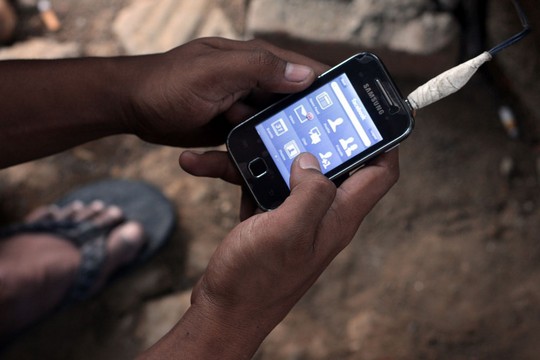The integration of mainstream and social media creates a more responsive news cycle
Ross Tapsell
Social media is perceived as playing a crucial role in political activism in Indonesia, mostly because of the growing number of Facebook and Twitter users in the country. The latest figures suggest that there are 43 million Facebook users in Indonesia, the second-largest number in any country in the world. The role of social media in distributing information means that devices such as the Blackberry are crucial for political activists, like those who used Facebook to publicise the ‘cicak versus buaya’ storm and the Prita Mulyasari case. But a key reason why these particular issues became media ‘mega-spectacles’ was because they were taken up by mainstream media.
Mainstream media still plays an important role in distributing activists’ messages to the public, despite the increase in social media usage. On most occasions, activists like to see wide-ranging media coverage of their causes not only because mainstream media reports reach a wider audience, but also because of the authority that they afford certain issues. Mainstream media reports can give the concerns pursued by activists greater legitimacy, particularly if they make news headlines and become the daily news ‘event’.
In Indonesia today, the largely separate realms of social media and mainstream media are fast becoming connected into one large news cycle as a result of two forms of media convergence: the convergence of traditional media and new social media platforms, and the convergence of monopolised media and smaller forms of alternative, grassroots or citizen-directed media. This pattern means social media is now an important part of how ‘events’ become news. It also gives activists greater ability to get their issue into the news cycle via easily accessible social media platforms. But there is also the risk that news distribution through social media will soon be engulfed by the powerful forces who own and control the mainstream media.
Cartelisation and convergence
The mainstream media in Indonesia is owned by a small group of prominent businessmen and politicians. It has been described as a ‘cartel’. Today, twelve media groups control all of the national commercial television shares. These groups also own five of the six newspapers with the highest circulation and all of the four most popular online news media. Increasing cartelisation continued into late 2011 when Indonesia’s biggest online news media site, Detik.com, was purchased for $AU66 million by Chairul Tanjung, the owner of television stations Trans7 and TransTV. These companies also have business interests outside of the media. For example, Globe Media is owned by James Riady, owner and Deputy Chairman of Lippo Group, which is the largest property owner and developer in Indonesia and has business interests in banking, publishing and retail.
A key challenge faced by Indonesia’s media moguls is the uncertainty surrounding the future of media, particularly print media. According to media executive, John Riady (son of businessman James Riady), ‘There is decreasing circulation of newspapers in Indonesia. The future of newspapers is as bleak as it is in the US or Australia. Indonesia is just slow to react, and soon it will be all online and very different. But there will always be a market for news, but in what platform we will see in the future.’ A recent Roy Morgan poll shows that television is the most popular medium for Indonesian audiences with 99 per cent having watched ‘any television station in the past 7 days’ compared with 26 per cent of respondents reading ‘any newspaper in the last 7 days’. But Roy Morgan’s Debnath Guharoy wrote recently in The Jakarta Post that it is the internet is ‘where the action is. Where the innovation is focused. In the not too distant future the reality of convergence will make all moving pictures and sound, whether TV or internet sources, one and the same thing.’
Indonesia has already moved to an era where major media companies no longer specialise solely in print, radio or television. Indonesian media executives like Riady understand that their survival is dependent on their ability to combine traditional news content with content from new media platforms and sites, including social media commentaries and amateur videos captured from mobile phones. While they previously thought Facebook and Twitter were purely for ‘social’ purposes, they now consider these tools to be essential in the dissemination of news and commentaries.
The arrival of new platforms such as the iPad and the iPhone has forced media companies to diversify. Globe Media, for example, was transformed in late 2011 into Berita Satu Media Holdings to ‘better reflect the wide range of news brands it owns across multiple languages, multiple platforms and multiple news cycles’. The company’s media convergence includes broadcast, print, digital, online, social and mobile media, events and an online news portal with live streaming, mobile phone applications and a high-definition television channel that it plans to launch nationwide in late 2012.
Another company, Media Indonesia Group, which along with MetroTV is owned by Surya Paloh, who established his own political party (the National Democrats) after he lost the Golkar Chairmanship to media mogul rival Aburizal Bakrie in 2009. Media Indonesia Group has been particularly innovative in the area of convergent media. Its daily news and monthly magazines are available through iPads and can be purchased through iTunes. News is distributed not only in print, but through photo slideshows, video, audio or even interactive graphics. The newspaper, Media Indonesia, has an e-newspaper and website where readers can share the paper’s news stories through various social media and other links. Media Indonesia Chief Editor Saur Hutabarat explained in 2010 that the company is advocating for more open debate in Indonesian society, fuelled by social media: ‘We are creating public debate. People can give their view on all topics and we give space for that view so they can freely express their thinking. The better way to solve our hidden problems is to try to discuss them in an open and transparent way.’
Increasing public debate
As Hutabarat’s comments suggest, media convergence is more than simply a technological shift. New media platforms are helping push journalism in new directions and have the potential to open the space for public debate on social and political issues. On online news sites, readers can comment directly underneath articles. In the online edition of some newspapers, readers can comment via their Facebook profile. In the past, readers usually commented using an online alias name, for example ‘brandy283’. Now, Facebook profiles normally include a photo and various other information or affiliations. The result is a more ‘accountable’ commentary in the mainstream press, but also an indication that many Indonesians are happy to be more public in their opinions through mainstream news.
The transformation from print media to media convergence has been particularly stark for Kompas, Indonesia’s widest selling newspaper, which has a reputation for being cautious when discussing politics and religion. Although this reputation was founded during the Suharto era, in the post-New Order period many inside Kompas still believed that responsible journalism meant toning down reports on contentious topics such as race or ethnicity. But social and new media platforms are transforming this practice. Kompas Chief Editor, Rikard Bagun, believes that modifications are essential because the Indonesian audience was changing as a result of the introduction of social and new media platforms, noting that ‘We now have a very open society, where everybody is declaring criticism openly – through social media for example’. In response, Kompas is slowly altering its reporting philosophy. Bagun argues: ‘If the media doesn’t speak out about things, it is difficult to solve the issues.’
 |
|
The kompasiana website allows users to produce content in the form of text, images and video / www.kompasiana.com |
As part of its reinvention, the Kompas group created kompasiana, a medium somewhere between blogging and citizen journalism, which allows users to produce content in the form of text, images and video. It is promoted in Indonesia as another attempt at media convergence. It incorporates print, internet, television and radio news, online and social media commentary including blogs and microblogs as well as social media sites Facebook and Friendster. In addition, photos can be uploaded through Flickr and twitpic and videos through YouTube. It claims to already have 2.8 million visitors per month.
Through initiatives like kompasiana, views and events discussed on social media that gain enough popular momentum are more likely to be viewed by the mainstream media consumer, providing an avenue for political activists to increase their visibility. However, some political activists fear that the diversity of viewpoints that currently characterises social media could decrease as the ownership ‘cartel’ gains increased control over the social media agenda. In some instances this seems to be occurring. For example, activists who campaigned for greater compensation for those displaced by the Lapindo mudflow on the outskirts of Surabaya could not get their viewpoint published in the Surabaya Post. This was because the daily newspaper was purchased in 2008 by the Bakrie group in 2008, whose subsidiary company, Lapindo-Brantas, was seen as responsible for the mudflow.
A market for free expression
As John Riady said, there will always be a market for news. But it is still unclear how this market will evolve. In the lead up to the 2014 Presidential election, media owners with political ambitions may attempt to control the information placed on their now increasingly convergent media networks. However, the rapid and complex ways in which media convergence is transforming Indonesian news and commentary makes controlling such information more difficult. The more voices and platforms through which people can express opinions and disseminate content, the more difficult it may be for elites to control the agenda.
As events around the world have shown, citizen journalism has found ways to circumvent attempts at censorship and control. Since Reformasi, Indonesians have become used to expressing their opinions online. Should media cartels attempt to hinder freedom of expression through cartelisation and convergence, they may be in for a fight. And in the battle for the Indonesian media market, the convergent media company whose business model allows for the greatest freedom of expression, may end up being the company which makes the most money.
Ross Tapsell (ross.tapsell@anu.edu.au) is a lecturer in the College of Asia and the Pacific at the Australian National University. He researches press freedom in Southeast Asia.












